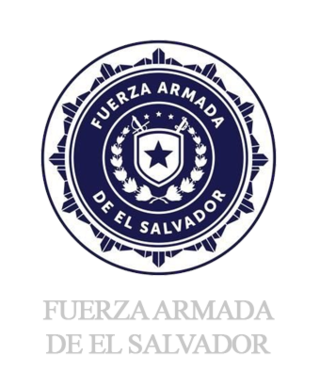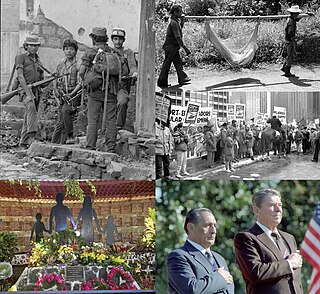
The Armed Forces of El Salvador are the official governmental military forces of El Salvador. The Forces have three branches: the Salvadoran Army, the Salvadoran Air Force and the Navy of El Salvador.

A death squad is an armed group whose primary activity is carrying out extrajudicial killings, massacres, or enforced disappearances as part of political repression, genocide, ethnic cleansing, or revolutionary terror. Except in rare cases in which they are formed by an insurgency, domestic or foreign governments actively participate in, support, or ignore the death squad's activities.

The Thahan Phran AKA the Royal Thai Paramilitary Force is a paramilitary light infantry force which patrols the borders of Thailand and is an auxiliary of the Royal Thai Army (RTA) and the Royal Thai Marine Corps (RTMC). The Thahan Phran operate in conjunction with the Border Patrol Police (BPP), but are trained and equipped to engage in combat while the BPP is primarily a law enforcement agency. In Thailand there is a common name of black clothing unit (นักรบเสื้อดำ) or the Black Army due to their wearing of black uniforms.

Salvador Roman Hidalgo Laurel, also known as Doy Laurel, was a Filipino lawyer and politician who served as the Vice President of the Philippines from 1986 to 1992 under President Corazon Aquino and briefly served as the last Prime Minister from February 25 to March 25, 1986, when the position was abolished. He was a major leader of the United Nationalist Democratic Organization (UNIDO), the political party that helped topple the regime of President Ferdinand Marcos with the 1986 People Power Revolution.

The Salvadoran Civil War was a twelve-year civil war in El Salvador that was fought between the government of El Salvador, backed by the United States, and the Farabundo Martí National Liberation Front (FMLN), a coalition of left-wing guerilla groups backed by the Cuban regime of Fidel Castro as well as the Soviet Union. A coup on 15 October 1979 followed by government killings of anti-coup protesters is widely seen as the start of civil war. The war did not formally end until after the collapse of the Soviet Union, when, on 16 January 1992 the Chapultepec Peace Accords were signed in Mexico City.
Galvarino Sergio Apablaza Guerra, nicknamed "Comandante Salvador," is a Chilean Marxist guerrilla and former member of the Manuel Rodríguez Patriotic Front (FPMR), which opposed the military dictatorship of Augusto Pinochet. He has participated in several highly publicized kidnappings and murders.
The Cinemanila International Film Festival is an annual film festival held in Manila, Philippines. It was founded by Filipino filmmaker Amable "Tikoy" Aguiluz in 1999. The focus of the festival is on the cinema of the Philippines as well as Southeast Asian cinema.

An extrajudicial killing is the deliberate killing of a person without the lawful authority granted by a judicial proceeding. It typically refers to government authorities, whether lawfully or unlawfully, targeting specific people for death, which in authoritarian regimes often involves political, trade union, dissident, religious and social figures. The term is typically used in situations that imply the human rights of the victims have been violated; deaths caused by legal police actions or legal warfighting on a battlefield are generally not included, even though military and police forces are often used for killings seen by critics as illegitimate. The label "extrajudicial killing" has also been applied to organized, lethal enforcement of extralegal social norms by non-government actors, including lynchings and honor killings.
Phillip Mikael "Ipe" Reyes Salvador is a Filipino film and television actor.
Bernabe Buscayno, also called Kumander Dante, is the founder of the New People's Army, the military wing of the Communist Party of the Philippines.

!Oka Tokat is a Philippine television drama horror fantasy series broadcast by ABS-CBN. Directed by Don Cuaresma, Laurenti Dyogi, Michael de Mesa, Rez Cortez, Ricky Davao, Johnny Manahan, Jerry Lopez Sineneng, Wenn V. Deramas, Cathy Garcia-Molina and Richard I. Arellano, it stars Ricky Davao, Rica Peralejo, Diether Ocampo, Jericho Rosales, Angelika Dela Cruz, Paolo Contis, Agot Isidro, Joy Viado, Giselle Sanchez, Marc Solis, Lorena Garcia, Bojo Molina, Carmina Villarroel, Alessandra De Rossi, Jeffrey Quizon, Tin Arnaldo, Mel Martinez, Onemig Bondoc, Meryll Soriano, Nelson Evangelista, Alwyn Uytingco, Shaina Magdayao, Emman Abeleda, Joy Chiong and Jiro Manio. It aired on the network's evening line up from June 24, 1997 to May 7, 2002, replacing Abangan ang Susunod Na Kabanata and was replaced by OK Fine, 'To ang Gusto Nyo!.
Corinne Dufka is an American photojournalist, human rights researcher, criminal investigator, and social worker. She is the recipient of a MacArthur "genius grant" Fellowship.

During the Salvadoran Civil War, on 16 November 1989, Salvadoran Army soldiers killed six Jesuits and two women, the caretaker's wife and daughter, at their residence on the campus of Central American University in San Salvador, El Salvador. Polaroid photos of the Jesuits' bullet-riddled bodies were on display in the hallway outside the chapel, and a memorial rose garden was planted beside the chapel to commemorate the murders.
The Central American Resource Center (CARECEN) are two community-based organizations that seek to foster the comprehensive development of the Latino community. CARECEN in the Washington, D.C. metropolitan region was founded in 1981 to protect the rights of refugees arriving from conflict in Central America and to help ease their transition by providing legal services. CARECEN provides direct services in immigration, housing and citizenship while also promoting empowerment, civil rights advocacy and civic training for Latinos. Another CARECEN is also located in Los Angeles and which was established two years after the D.C. location.
Human rights abuses in Jammu and Kashmir range from mass killings, enforced disappearances, torture, rape and sexual abuse to political repression and suppression of freedom of speech. The Indian Army, Central Reserve Police Force (CRPF), and Border Security Personnel (BSF) have been accused of committing severe human rights abuses against Kashmiri civilians. According to Seema Kazi, militant groups have also been held responsible for similar crimes, but the vast majority of abuses have been perpetrated by the armed forces of the Indian government.

The War on Drugs is the intensified anti-drug campaign that began during the administration of President Rodrigo Duterte, who served office from June 30, 2016, to June 30, 2022. The campaign reduced drug proliferation in the country, but has been marred by extrajudicial killings allegedly perpetrated by the police and unknown assailants. By 2022, the number of drug suspects killed since 2016 was officially tallied by the government as 6,252; human rights organizations and academics, however, estimate that 12,000 to 30,000 civilians have been killed in "anti-drug operations" carried out by the Philippine National Police and vigilantes.

The following is a timeline of protests against Rodrigo Duterte, the 16th President of the Philippines, and his policies. Issues were addressed in the protests including the war on drugs, employment issues, anti-terror law, and the government's response to the COVID-19 pandemic.
The dictatorship of 10th Philippine president Ferdinand Marcos in the 1970s and 1980s is historically remembered for its record of human rights abuses, particularly targeting political opponents, student activists, journalists, religious workers, farmers, and others who fought against his dictatorship. Based on the documentation of Amnesty International, Task Force Detainees of the Philippines, and similar human rights monitoring entities, historians believe that the Marcos dictatorship was marked by 3,257 known extrajudicial killings, 35,000 documented tortures, 737 'disappeared', and 70,000 incarcerations.
In the Philippines, red-tagging is the labeling of individuals or organizations as communists, subversives, or terrorists, regardless of their actual political beliefs or affiliations. It is a type of harassment and has pernicious effects on its targets. Red-tagging has been practiced by security forces, government officials and shills.
Ray Ventura was a Filipino character actor.










